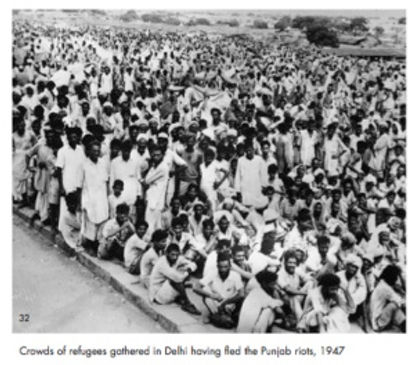I mentioned in a previous post about my intention of continuing work on my poem on India’s partition. Well, the poem has been taking shape and what started off as a short 10-line poem then developed into a long 6-verse, 120-line poem set across different times and spaces (India’s partition in 1947, Puglia in 2014, London in 2013, Delhi in 1998) encompassing the core themes of internal and external division and identity. Last week was a reset of sorts when after a couple months of editing, we (as in my teacher, Pele Cox, and I) realised that of the six verses , only two fit in the story. The other verses were good but did not connect with others as coherent story. So with a heavy heart I let them go – it’s back to square one now and back to the writing table.
For this work, I have taken inspiration from postcards, exhibitions, books, articles, cover pages….and meditated on the artifacts themselves to let the words flow. A friend recently returned my copy of the best book on partition I know of “The Great India Partition” by Dr. Yasmin Khan. While skimming through the pages a line caught my attention “The poet Louise MacNeice witnessed similar scenes. He was part of a British BBC features and news team sent to the subcontinent to record the imperial transition”.

We walked straight into the massacres that followed Partition . . . it was Louis’s first sight of violence, death, complete and utter disorder. He was physically shaken by it. But, suddenly, I saw a totally different Louis. Louis as a man of action . . . ordering people about and they obeying him . . . He was no longer the detached observer, but deeply and profoundly involved in the human dilemma.”
Wynford Vaughan-Thomas, Archive Hour: Louis MacNeice (2007)
I said to myself – how wonderful and amazing it would be to read this script, to learn what a poet’s eyes saw during the Partition.
A month later I am sitting at the BBC Written Archives Centre in Reading. My very helpful research advisor, Julian Carr, pulls out the microfiches from a green metal drawer. I see the microfiche, page by page on a computer and am transported to another timeless world. I go through not just one but all the scripts of the six programmes he produced. Know not what exactly I am looking for but of the 200+ pages I read, I print out 21 of them whose words speak to me. These are the meditative artifacts to take my poem further.
The scripts also feature lines from other poets, and these ones gave me goosebumps.

From Walt Whitman’s Passage to India
Passage to India!
Struggles of many a captain—tales of many a sailor dead!
Over my mood, stealing and spreading they come,
Like clouds and cloudlets in the unreach’d sky.
From Rabindranath Tagore’s ‘Where The Mind is Without Fear”
Where the world has not been broken up into fragments
By narrow domestic walls
Where words come out from the depth of truth
…..
Where the clear stream of reason has not lost its way
…..
Where the mind is led forward by thee
Into ever-widening thought and action
Into that heaven of freedom, my Father, let my country awake.

I also loved the poetic image of a bird in Gandhiji’s garden describing what it sees happening in Gandhi’s abode during the Delhi partition riots and then his assassination: ‘That little bird lives in the garden. And if it could speak it could tell you things…”
And not to forget his description of refugees in Old Fort, Delhi: “But where ate the well-kept lawns? I can see some trees emerging from this sea of humanity but – no, noy a blade of grass. Nothing but white tents and blue tents and sort of makeshift wigwams – though most of them are sleeping in the open. How many I wonder…Yes, sixty thousand refugees here. They’re not only squatting on every inch of ground, they’re perched up there on the ancient ramparts and the niches below are as full as bee-hives”
The lines below – I cannot even find the words to describe them:
“You will meet me – many times over. Around Amritsar and Lahore, in a burqa or a sari, dragging along the roads or clinging to trucks and bullock carts running the gauntlet of hatred. You will meet me huddled in refugee camps, clasping a child like a broken doll – a doll that someone has cut with a pen knife. You will meet me, many times over, cholera-stricken and vomiting. You will meet me lying on my back in the gutter with me legs apart and white skirt rusty brown and the flies like a black nebula spiralling over the spear wound. Yes, and you will meet me dead. Many times over dead. And before tomorrow’s curfew – “





Comments